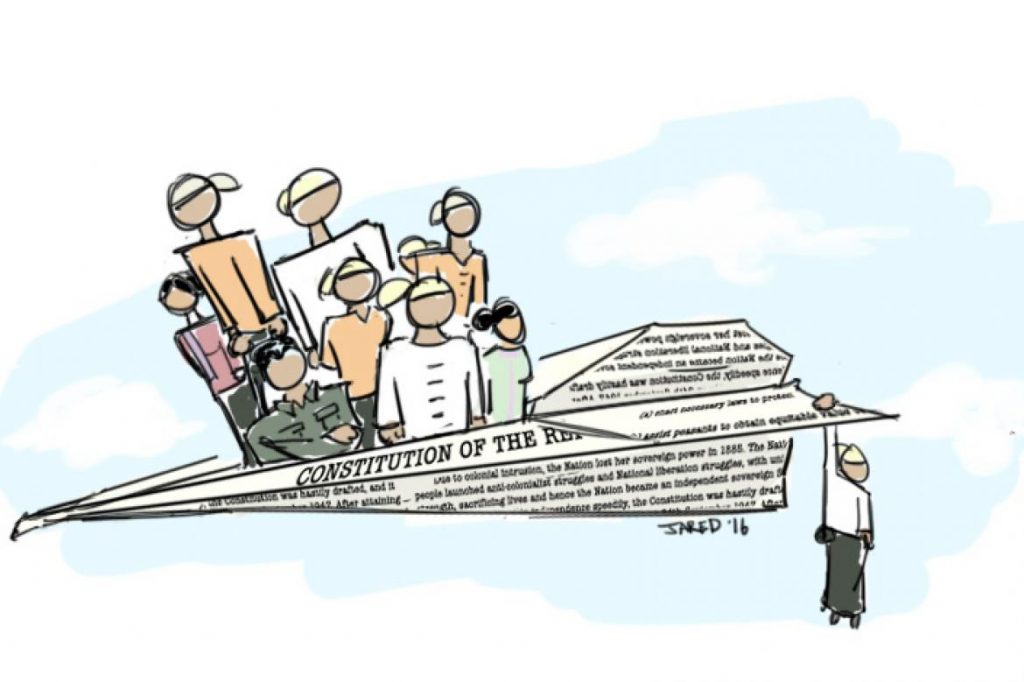What is the NLD’s strategy in the Sittwe assembly?
The entire raison d’être for 20 years of military rule — at least insofar as the official line went — was to ensure Myanmar was on a sustainable path to peace and reconciliation before the handover to a civilian government, thus avoiding the conflicts that beleaguered and ultimately brought down the U Nu administration in 1962. So why is it that after taking nearly two decades to draft, Myanmar’s Constitution reads like an instruction manual for provoking discord?
The Constitution, still in its infancy, is hardly a robust document. Military leaders have taken the broadest possible interpretation of Article 59(f) to disqualify Daw Aung San Suu Kyi from the presidency, but raised no objection when departing President U Thein Sein was returned to the “honorary” chairmanship of the Union Solidarity and Development Party last August and campaigned in the November election, despite Article 64 barring incumbent heads of state from taking part in political activities. Ethnic seat allocations in state and regional assemblies (Article 161) are based on census data from more than 30 years ago and are without doubt disenfranchising ethnic communities in various parts of the country.
It is farcical that every parliament across the country has essentially sat idle since electing speakers at the beginning of February, as lawmakers wait for the next president to take office in April and the subsequent appointment of chief ministers. Worse still is the declaration by outgoing Information Minister U Ye Htut that incumbent ministers are not accountable to the new parliament, which is at best a novel take on the intended purpose of legislative oversight. Numerous observers have marvelled at the Constitution’s deft articulation and protection of military power. On that criteria, it is an immaculate work. As a manual for governance, it is a shambles in dire need of reform.
At the moment however, it is one of the most unambiguous provisions of the Constitution that is riling political leaders.
Under the charter, the appointment of chief ministers is the prerogative of the president — much to the consternation of ethnic parties, who quite legitimately want a devolution of political power to a sub-national level. Perhaps under the reasonable expectation of a sizeable election victory, the National League for Democracy distanced itself from ethnic party demands to delegate chief ministerial appointments to state and regional assemblies while the parliament considered constitutional reform proposals last year.
Support more independent journalism like this. Sign up to be a Frontier member.
Now on the cusp of government, NLD spokesman U Win Htein told reporters on March 3 that all but one of Myanmar’s 14 chief ministers would be appointed from within his party’s ranks — including in Rakhine State, where the NLD has neither a majority nor the largest single share of assembly seats. (Shan State is the sole exception.)
Conditions in Rakhine — home to an impoverished people, segregated and squalid Muslim ghettos and a potent atmosphere of febrile resentment — are a national disgrace. When it comes to selecting the next chief minister of the Sittwe assembly, there are no good options. A Rakhine National Party appointee would embolden the supporters of party chairman Dr Aye Maung and deal a serious blow to any hope of a rapprochement between the state’s Buddhist and Muslim communities. To pass legislation, an NLD appointee would rely on the support of military MPs and a sympathetic faction in the RNP, already teetering on the precipice of a split in the wake of party patron U Aye Thar Aung’s appointment as deputy speaker of the Amyotha Hluttaw.
In opting to appoint one of its own, the NLD has opted for the least-worst option in Sittwe, even if the party is forced into an unholy parliamentary alliance with the military. The more cynical might conclude the party’s motives to be rather more self-serving, particularly after last year’s election demonstrated that intra-ethnic political divisions ultimately benefit the NLD’s chances at the ballot box. It should certainly be hoped that the party has thought further ahead than entrenching its own control through Machiavellian games. Political acrimony has a way of escalating quickly in Rakhine, to say the least.
Postscript: This editorial appeared in Issue #37 of Frontier, published on March 3. On March 13, the Rakhine National Party met to expel five members of its central executive committee. All of those ordered out of the party originally belonged to the Arakan League for Democracy, a party formed to contest the 1990 election. U Aye Thar Aung, the ALD’s former chairman, is now the only former member of that party to sit on the RNP’s executive.







